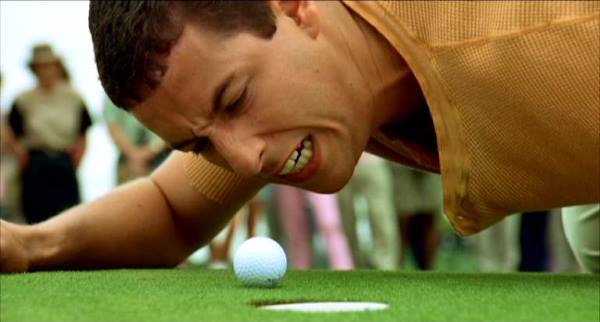Josh’s Tips & Tricks: Positive Self-Talk
Intro
Hello golfers, welcome to this week’s tips & tricks. I would like to discuss the importance of sports psychology this week and how you can improve your game without hitting a million balls on the driving range. This week is about positive self-talk and how you can become your own caddy and coach.
Self-Talk

During every single day we experience thousands of thoughts, both positive and negative. It seems in golf that this happens a lot and a lot more emotion is attached to it. Golf is hard and can be very emotionally draining (I’m speaking from experience here) and therefore it’s important to keep a cool head to stop the balance swaying one way or the other.
Self-talk is your interpretation of those thoughts and emotions. It’s important to realize that it’s ok to experience emotions such as anger and disappointment. It’s how you respond to them that counts. You can either regulate them, or let them control your behavior. Just because you feel angry or disappointed (every golfer feels that way at some point during a round), it doesn’t mean you have to start beating yourself up. If you choose to have negative self-talk, you’ll turn those emotions into self-doubt and questions of your ability. In golf, this means more tension, a lack of focus and poor shots.
E.g. Let’s say you’ve just hit the ball into the water or out of bounds. It’s perfectly normal to feel however that outcome makes you feel. Most golfers are very competitive so it will be natural to feel something (frustration, disappointment etc.) in response to seeing their ball land in the water or out of bounds. But having those emotions doesn’t mean you have to start having doubt caused by negative self-talk. Experience and acknowledge the emotion and then move on using positive self-talk.
Identify Self-Talk

The first step to managing automatic thoughts is to notice them. Are you listening? Do you hear what those thoughts are telling you? In your next round, jot down in a notebook or on your scorecard each time you have a reaction to a shot that includes negative commentary. Perhaps you missed a short 3-foot putt and respond mentally with “I’m such a horrible putter.” Note this so you can examine it later. After the round, count how many times you respond with automatic, self-deprecating statements. You might be surprised at how active your brain is at tearing you down and limiting your success on the course.
Under Pressure
Perhaps the most important time to be aware of your self-talk is when you’re struggling or feeling under pressure. As we all know, the mental game is easy when things are going well, it’s not until you experience adversity and those emotions that go with it, do you find out how good your mental game really is.
Remind yourself that you are a mentally tough competitor and that you have a champion’s mindset! The more you can train yourself to acknowledge (“I feel …”) and reset using positive self-talk, you’ll get better at bringing yourself back to your optimal performance state. By reflecting upon this (the emotions you experienced during the round and how you dealt with them) after your rounds, and you’ll increase your awareness and get better at it.
Changing Your Beliefs
Your belief system (aka your subconscious mind) which controls most of your behavior at any given time, can be shaped by self-talk. The subconscious listens to all your self-talk and accepts it to be the truth.
Repetition of these phrases and visualizing those goals vividly can change your belief system and bring them closer towards you. Notice what words have the best affect on you and add them to your motivational script for when you need it.
Examples of this may include:
- I’m good at finding fairways with my 3 wood
- I can trust my process for every shot
- I can always hit the next shot better
- I’m good at holing out from 3 feet
- I have control of my emotions
Be Your Own Caddy

Many players use self-talk during their pre shot routine to keep themselves committed to the shot. Lots of players say they perform well with a caddy because they are able to verbalise and fully commit to the shot, improving results. The good news is that you can easily do the same thing with your self-talk! Experiment with describing the shot you want to hit (not the one you don’t) during your pre-shot routine.
During your rounds, notice the tone of your self talk and whether you are talking to yourself in the form of negatives or positives. You wouldn’t tell your mate to not commit to the shot before he hits it tell him he always hits that club right. Nor would you say how rubbish he is at putting on the green. These are all examples of how you say things to yourself but your playing partner or caddy wouldn’t. Always try to avoid “DON’T”. You will never heard a good caddy saying “don’t hit it in those trees” so why do you say it to yourself? Traditionally “where the focus goes, the energy flows”! Try to always focus your attention on one specific point and trust hitting at that point. Tell yourself in your head that you are going to hit a good shot at that target and trust it. If any doubt or negative thoughts creep in, step away and reset until you can trust it.
Build on Positives
If you hit a shot particularly well, remember to celebrate and anchor success. Use some positive self-talk to enhance that positive feeling and store that memory. This can be very powerful moving forward and building confidence. As we know golf is a game of confidence.
Every day is a new opportunity to change your belief system and how you deal with negative thoughts. Notice how you are interpreting the world around you and decide to see it a more positive way – you’ll benefit enormously from doing so in the long-run!
Summary

Be aware of how you talk to yourself. Try to always be positive and focus on what you do want to do, rather than avoiding what you don’t want to do. We are all our own biggest critics but sometimes you just have to shrug your shoulders and look forward. Every day is a new day to learn and every golf shot is a new experience. Staying positive in golf and in life can be very challenging at times but it’s why we love this game.
If you would like any help with the psychological aspect of the game you know where I am. It’s a topic very close to home and I love trying to help people get the most out of their game in ways other than on the driving range.
For help in any aspect of your game BOOK A LESSON HERE NOW.
Cheers,
Josh

